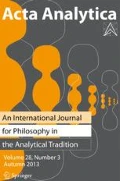Abstract
Abbate (2019) argues that, under certain conditions, cat guardians have a moral duty to allow their feline companions to roam freely outdoors. She contends that outdoor access is crucial to feline flourishing, which means that, in general, to keep cats indoors permanently is to harm them. She grants that, in principle, we could justify preventing cats from roaming based on the fact that some cats kill wildlife. However, she points out that not all cats are guilty of this charge, and she argues that, in any case, cats do not cause more harm to wildlife—and may actually cause less—than those animals would suffer anyway. I criticize both of these replies, arguing that cat guardians have a responsibility not to let their cats harm wildlife; that cat guardians usually do not know whether their cats kill wildlife; and that, on balance, cat caused harms to wildlife may well outweigh the harms that cats suffer when confined.
Notes
Despite the obvious practical significance of this issue for many ordinary people, and the remarkable amount of attention that it received in the popular media, the philosophical literature on the topic is very small—essentially, just DeGrazia (2011), Palmer and Sandøe (2014), and now Abbate (forthcoming a), with the discussion in DeGrazia (2011) being extremely brief.
It’s much less clear how we should assess the net effect of being kept indoors on wellbeing, given that indoor environments protect cats from various threats.
See, e.g., Abbate (2018), forthcoming b).
Obviously, there’s an evolutionary sense in which patrolling territory and hunting are “natural” for cats. And in that sense, the teenage son’s actions aren’t natural. But it’s hard to see how naturalness is relevant here. Suppose that patrolling territory and hunting had not been selected for, that it was an evolutionary accident that these behaviors contribute significantly to feline well-being. Or suppose, more radically, that an evil scientist found some way to reprogram cats who had not wanted to patrol or hunt such that they now do want to do these things. Either way, it would still matter that these behaviors are now, in fact, important for well-being, and their unnaturalness would be irrelevant. These cases show that the origin only matters for epistemic reasons: The evolutionary story increases our confidence that these behaviors are important for felines. The origin story does not matter for moral reasons.
Granted, Abbate could deny this. Sometimes, I’m inclined to deny it too. But there are costs to rejecting it. For instance, if we deny that death is a greater harm than being prevented from flourishing, then we may be committed to saying that it would be better for most wild animals to die, given the extensive suffering in nature that prevents them from achieving high levels of wellbeing.
To be clear, the claim here is not that cats confined indoors have 80/100 possible units of wellbeing. Rather, it’s that relative to their base rates of wellbeing, which are determined by a range of environmental and individual factors, confinement reduces feline wellbeing by another 20 units.
The “owned” vs. “un-owned” language is from Loyd et al. (2013a). Some might object to this language on the grounds that rights-bearers cannot be owned, even if they can be kept captive. In my view, however, there’s room for reasonable disagreement here even among proponents of the rights view. We might think that it’s valuable to highlight that these cats are owned, thereby drawing attention to a system within which they are reasonably—albeit wrongly—viewed as property.
I generated the numbers for reptiles and amphibians by assuming that we can attribute 89% of the total estimate to un-owned cats, which is the percentage of mammalian deaths that they attribute to un-owned cats (vs. the 69% of avian deaths that they attribute to un-owned cats). This only helps Abbate, but it does not make much difference, as those numbers are relatively small to start.
References
Abbate, C. E. (2018). Harming some to benefit others: Animal rights and the moral imperative of trap-neuter-release programs. Between the Species, 21, 94–127.
Abbate, C. E. (2019). A defense of free-roaming cats from a hedonist account of feline well-being. Acta Analytica. https://doi.org/10.1007/s12136-019-00408-x.
Abbate, C. E. (2020). Animal rights and the duty to harm. Zeitschrift für Ethik und Moralphilosophie. https://doi.org/10.1007/s42048-020-00059-3
DeGrazia, D. (2011). The ethics of confining animals: From farms to human homes. In T. Beauchamp & R. G. Frey (Eds.), The Oxford handbook of animal ethics (pp. 738–768). Oxford: Oxford University Press.
Kays, R. et al. (2020). The small home ranges and large local ecological impacts of pet cats. Animal Conservation. https://doi.org/10.1111/acv.12563
Loss, S. R., Will, T., & Marra, P. P. (2013). The impact of free-ranging domestic cats on wildlife of the United States. Nature Communications, 4, 1–7.
Loyd, K. A. T., Hernandez, S. M., Carroll, J. P., Abernathy, K. J., & Marshall, G. J. (2013a). Quantifying free-roaming domestic cat predation using animal-borne video cameras. Biological Conservation, 160, 183–189.
Loyd, K. A. T., Hernandez, S. M., Abernathy, K. J., Shock, B. C., & Marshall, G. J. (2013b). Risk behaviours exhibited by free-roaming cats in a suburban US town. Veterinary Record, 173, 295–301.
Palmer, C., & Sandøe, P. (2014). Captive cats: Should cats be routinely confined indoors for their own good? In L. Gruen (Ed.), Ethics of captivity (pp. 135–155). Oxford: Oxford University Press.
Acknowledgments
Thanks to C. E. Abbate and an anonymous reviewer for very helpful feedback on earlier versions of this paper.
Author information
Authors and Affiliations
Corresponding author
Ethics declarations
Conflict of Interest
The author declares that he has no conflict of interest.
Additional information
Publisher’s Note
Springer Nature remains neutral with regard to jurisdictional claims in published maps and institutional affiliations.
Rights and permissions
About this article
Cite this article
Fischer, B. Keep Your Cats Indoors: a Reply to Abbate. Acta Anal 35, 463–468 (2020). https://doi.org/10.1007/s12136-020-00431-3
Received:
Accepted:
Published:
Issue Date:
DOI: https://doi.org/10.1007/s12136-020-00431-3

